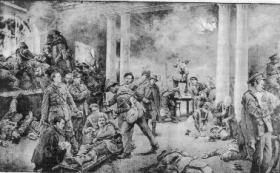1916 glorification distasteful
Published in 20th-century / Contemporary History, Issue 3 (May/Jun 2006), Letters, Letters, Revolutionary Period 1912-23, Volume 14
Paget’s Scene in the General Post Office, Dublin, just before its evacuation—not simply an illustration but propaganda. (National Museum of Ireland)
Sir,
—Hot on the heels of comparing Ulster unionists to the Nazis, it now seems that Mary McAleese wishes to reinstate the glorification of a rebellion that caused immeasurable suffering to the very people the insurgents were seeking to free from ‘oppression’. This seems particularly unfortunate at a time when the Republic of Ireland seemed to be moving away from its rigidly sectarian past to a more pluralistic and inclusive society.
While I have come to expect little else from Ms McAleese, I must admit to a measure of disappointment on receiving my copy of History Ireland. Notwithstanding a brief article by Paul Bew as a token gesture towards balance, plenty of opportunities were found to tell tales of derring-do as the plucky and virtuous patriots took on the might of the evil British Empire. Space was found for Paget’s depiction of the scene in the GPO, not as an example of the propaganda that it undoubtedly was but simply as an illustration. In the same vein, opportunity was also found for a picture of Pearse in heroic profile.
As a northern unionist I look on such glorification with distaste, but my concerns can be ignored on the basis of political bias. However, I have more fundamental historical objections. Firstly a decision to commemorate 1916 as a state occasion seems to link the independent Ireland to the events of Easter week, ignoring the democratic progress Ireland had been making towards independence for the previous 40 years. Indeed, it could be argued that the state that emerged in 1922 owed considerably more to John Redmond than it did to Patrick Pearse et al. However, the cry of ‘Up the rebels’ plays considerably better with a certain constituency within the island (and indeed sells more copies of historical magazines).
However, the biggest tragedy of 1916 is the way it has provided a rationale for subsequent generations of Republicans to bring untold misery to the people of Ireland in the hope that history will provide their actions with a retrospective justification. Perhaps Ms McAleese would also like to honour the Irregulars of 1922–3 for their continuation of the struggle of the men of 1916. Can I look forward to an official commemoration of the actions of the most recent attempt by Republicans to free Ireland’s occupied six counties? Will Omagh, Enniskillen and Claudy one day be remembered with such affection as Dublin, Enniscorthy and Ashbourne?
Of course it is important for the Irish state to remember its history, but an uncritical glorification of one of the most contentious and divisive events of the recent past is anachronistic in a modern twenty-first-century democracy. The people of Ireland must ask themselves if this is really the image they wish to portray to the outside world, and particularly to those living on the other side of the border.
—Yours etc.,
JONATHAN WYLIE
Newtownabbey
Co. Antrim
















